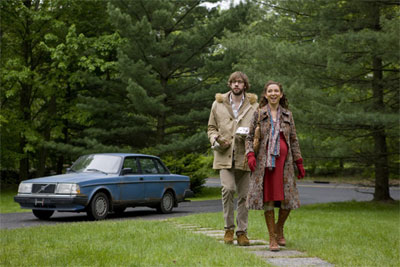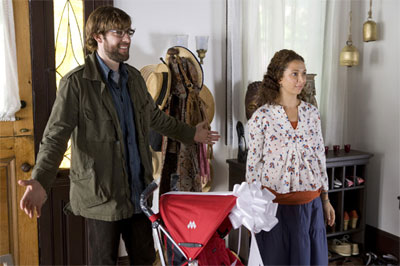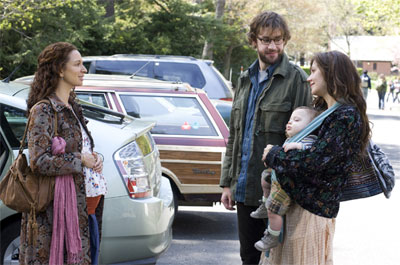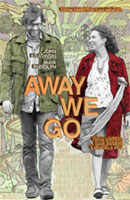Sam Mendes Away we Go Interview

SAM MENDES GOES ON A DIFFERENT ROUTE.
EXCLUSIVE Sam Mendes, Away we Go Interview by Paul FischerBritish director Sam Mendes tends to take on complex and confronting material as a filmmaker. He made an auspicious debut directing Alan Ball's original script, American Beauty. Since then, his films have included the diverse likes of Road to Perdition and last year's acclaimed Revolutionary Road, on which he directed wife Kate Winslett. Mendes' latest film is the offbeat dramedy Away we Go, starring John Krasinsky and Maya Rudolph, in the story of an expectant, unmarried coup[le who go on a road trip in order to figure out where to raise their unborn child but discovering some home truths about life, love and friendship throughout. It's the first film that Mendes made since American Beauty that is derived from an original script. He spoke to PAUL FISCHER in this exclusive interview.
QUESTION: I was surprised to read that Away we Go is the first original script you've shot since American Beauty. Is that right?
SAM MENDES: The first original screenplay. Yeah. I mean, the others are all adaptations of things. You know, Road to Perdition was a graphic novel. Jarhead was a memoir. Revolutionary Road was a novel, do you know what I mean? So, yeah. The first original screenplay.
QUESTION: Why are you drawn more to adaptations then, do you think?
SAM MENDES: I don't think I am, really. I mean, most people - if you think about it, most people do adaptations, or things based on fact. I mean, I would much rather work on original screenplays all the time. Unfortunately, there's only been [LAUGHTER] - like, the idea of respected work by a really good writer - you know, it happens less and less now. I'm not drawn to the high-concept genre things, so, these movies aren't difficult to make. You know? They generally don't even cost very much money.
QUESTION: What was it about this one that you found particularly appealing? How did it come to you? You're an A-list director. So how does something like this come your way?
SAM MENDES: Well, actually, somebody told me about the fact that Dave Eggers had written the script. I didn't know he'd written it with his wife, at that stage and I just sought it out, because I'm a big Dave Eggers fan. Someone just mentioned it. And I discovered that nobody was doing it. And I called him up and said, "Look, you know"-I'd read it by this stage. And I said, "Can I take you out for lunch?" And I went out for lunch, and I said, "Well, I'd really like to do this." And he was very suspicious. I think he thought I wasn't serious. And I said, "No, no, I really will. I'll do it now. I'm ready to go. I think I can make this very quickly." And he was thrilled. It all happened very fast, after that. But I kind of sought it out, because I'd heard about it. And that's how it took off.
 QUESTION: How do you go about casting this? I mean a movie like this can fall on its sword if it's not cast properly. How careful were you in the casting process?
QUESTION: How do you go about casting this? I mean a movie like this can fall on its sword if it's not cast properly. How careful were you in the casting process?SAM MENDES: Oh, very. I'm always very, very careful. I mean, you know. I won't make it - I basically don't compromise, you know? But I was very lucky, because Focus, who made the movie, basically said to me, "Look. You know, cast who you want." And that's very rare, that any studio - in fact, I don't think a studio's ever said that to me before. So, you know, normally what they'd say is, "We'll make this movie with one of the following seven actors. And if you can't get those actors, then we're gonna struggle to sell it." In this case, they said, "You cast who you think is best for the roles." And so that's exactly what I did. And I'd worked with John Krazinsky in Jarhead before he did The Office. And he did four or five lines. And I knew from that moment that he was something special. Which I think he is. And I've watched with great delight, as he became better-known and started doing movies. But he was the person that came into my head when I read it. And I mentioned it to Dave and Vendela, and they said, "Well, we thought of him as well, because he's tall and lanky." And so they'd already had that thought. And they suggested Maya to me. Who I know, and loved from Saturday Night Live, but - you know, had never seen do anything like this. So I met with her, and she read, and she was fantastic. You know, and so that was how we got them together.
QUESTION: This is as much a film about America as it is about relationships, and childbirth, and I was wondering, as a Brit who seems to have his pulse on the American psyche - Revolutionary Road was another one that was so much about America - where does that come from, within you?
SAM MENDES: You know, I really don't know. I mean, I'm very drawn to America. I mean, for a start, I've lived here for five years now. So, you know, I live in New York and so part of it is circumstantial. But it's easier for me to make movies about America, because I live in America. But another part of it is that - you know, from very, very early on, when I began to think about making films, when I was a student, I was influenced by movies like Paris, Texas, and David Byrne's movie True Stories, very early on, that made it clear to me that America has a mythic landscape. And that's one of the reasons why it is so possible to make movies and stories that would seem, in other countries, possibly to be small. But give them a kind of mythic scale. And in this case, the country's so big, the idea of a road trip across America - there's an element of quest about it. You know, a sense of scale which maybe it wouldn't have, if you were in another country. So, that's why I was drawn to it. But, you know, it's a puzzle to me as well, Paul, because - every time I think, "Well, the next one's probably going to be an English movie, or a European movie"-and then a script turns up, and I fall in love with it, and it's not. You know? So, I've got over making any promises that I'll make movies elsewhere, and I'll just - you know, all I'll ever say now is, "I don't know where I'm going to go next." And it may be an American movie, or it may not.
QUESTION: Now, because landscape is such an integral part of this, how hard is it for you to shoot in disparate locations and keep the costs down?
SAM MENDES: It was pretty difficult. I mean, we shot half of it - all the interiors were in Connecticut. And then we went on the road, because that's what needed to be - it really needed to have a different feel. So, Miami, Phoenix, Tucson, Colorado. And it was difficult. I mean, it was also difficult for me, as someone who's used to having bells and whistles - you know, being able to shoot longer days, and more days, with more equipment and more money, basically. But it was very, very good for me to be working on a much smaller scale and to not have all the time, and to be more inventive. And in a weird way, it's something I embraced. I mean, I thought it would - it shook me out of any habits I may have got into. And, in fact, it did. And it was-- one of the aspects of the movie I ended up doing the most was the speed at which we had to work. Because it makes you more fluid, and less - less time to become obsessed with details.
 QUESTION: In fact, this is very much an indie film or, certainly being released by a studio. Did you approach it very differently? I mean, you're not used to - you haven't done a film on this scale for a while. I was wondering, did you have to completely change your whole attitude towards filmmaking?
QUESTION: In fact, this is very much an indie film or, certainly being released by a studio. Did you approach it very differently? I mean, you're not used to - you haven't done a film on this scale for a while. I was wondering, did you have to completely change your whole attitude towards filmmaking?SAM MENDES: Not my whole attitude. But I certainly changed my working methods, yeah. I mean, the last movie I made on this scale was American Beauty. And, you know, I just had to remind myself what it was like - you know, it wasn't so long ago. I had to remind myself what it was like - you know, to not have everything I wanted. To somehow cut to the center of the scene and to capture the spirit of scenes, rather than having to dot every I and cross every t, you know? And - but I also felt that the material demanded a looseness, a freedom, a sense of improvisation, a sense of fun. And those are things that were encouraged by making it in a less - in a faster way. With a little speed, and a little lightness of touch.
QUESTION: I loved your music choices in this.
SAM MENDES: Oh, thank you.
QUESTION: And again, given the fact that there had to be a balance between art and cost, was it difficult for you to come up with movie choices that were also cost-effective?
SAM MENDES: Well, I always wanted kind of one voice, basically, and one singer-songwriter accompanying the material through the movie. I mean, you know, I find that some of the most satisfying uses of songs in movies are when one singer-songwriter is used to accompany a whole movie. I mean, the obvious examples being The Graduate, Harold and Maude, and Magnolia, these sorts of movies. And so I was looking very much for somebody who could define - through sound, define the spirit of the film. And I found Alexi Murdoch, whose album I loved, and who's young - and I tried his songs out. And each time I tried it, it seemed to work, and it seemed to open up the movie in an interesting and a different way. And brought a sort of melancholy emotional depth to the film. And allowed the landscapes of the day to sing as well. And then I contacted him and said, "Listen. You know, I'm using most of your album in my movie. Do you want to come and write a couple more songs?" And he came and wrote three more songs, and became very much a part of the process of finishing the movie. And he's great. I mean, I feel very fortunate that he was around. Because I think he's a real talent, and I hope that it leads to better things for him, because he's certainly good enough.
QUESTION: Now, you started much of your directing career in the theatre. That's where you have your roots. I was wondering how you think you've evolved as a filmmaker, and what facets of your theatrical training do you bring into your filmmaking?
SAM MENDES: Well, I think that - you know, it's funny now. I mean, anyone can make a film, and anyone can pick up a DV camera and make a not-bad-quality movie. And so there's a plethora of talented filmmakers. But there aren't many people that are used to telling stories that last two hours, you know? Day in, day out. To a bunch of people in a room. And that's what theatre has taught me, you know? How to tell a story, with actors and a script. And - you know, once you remove the technical aspects, there's no great difference between theatre and film. You know, that you're telling a story. And you're telling a story in a way that you think suits the material. So in many ways, there are a lot of similarities. And my way of working with actors is very similar. You know, I do various different things at different stages. I rehearse in a different way, I - you know, obviously work with them a different way in front of a camera, than I do when they're on stage. But the spirit of the enterprise is the same. And - you know, I don't find myself behaving any different, depending on what I do.
QUESTION: I was a huge fan of Revolutionary Road and I was surprised that DiCaprio was not as recognized for that. So I was wondering if there was a danger in working with quote-unquote "A-List" stars, because you do, obviously, bring out the best in these people. Yet they also come to a project with X-amount of baggage and perceptions. Is that something that you were conscious of while that film was being promoted, and certainly during the awards season?
SAM MENDES: Well, I was very conscious of it with Kate and Leo, because, you know, you could hardly get more baggage than bringing the pair who did Titanic back together again. So, I was prepared for that. And - you know, it would be naïf of me to say that it was a surprise that people went on and on about that. You know, sometimes it's frustrating, because I think that they were blinded, a little bit, to the fact that Leo gave a really great performance. I mean he stripped himself naked, psychologically. I felt it was an incredibly moving portrayal and I think that - you know, there is an issue with Leo, which is that people still - his boyishness. You know, they still find him difficult to take seriously as a man. But I found that it was his very boyishness, and his openness, that made him moving as Frank. Because, you know, he is a boy trapped in a man's world, in a way. And that that - his vulnerability is very touching. But - I mean, you know, you get used to the fact that - I mean, I have a few years in the theatre. You know, awards are not - you can't judge whether somebody's good or bad on the basis of how many awards they win. It's about timing. Is the audience ready to see this person in this role at the moment? Is this audience ready to see this movie at the moment? The world that we found ourselves in at the end of last year, and still find ourselves, in a world in which people are losing their homes and lives and unable to pay their mortgages, and having to reassess their whole existence - is not necessarily a world that wanted to see a story about a middle class couple who live in a very nice house, and are somehow unhappy. I mean, a lot of audiences would probably think, "Well, who cares?" You know? And you can't argue with that. It's not that - you know, people respond to these things through the prism of the moment. You know, American Beauty was a perfectly-timed movie. If it had come along three or four years later, it wouldn't have got the same response, you know? And it's exactly the same with something like - with any movie. But particularly zeitgeist movies, like American Beauty, or something like Slumdog, which I absolutely loved. But it was so perfectly timed, as a movie. And you learn that these things are not entirely in your hands. And all you can do is concentrate on what is in your hands, which is making the best movie you can out of the material and with the actors that you've got. And I felt, and still feel, very proud of Revolutionary Road. And I think that history, in the end, will judge it - you know, and forget who did or didn't win the award. You know, otherwise, you just - you know. But I would be lying if I said it isn't lovely, Paul, to be releasing a movie in the summer, away from awards season. And away from that sort of pressure. Because it's an unnatural pressure to place on any movie. Particularly one that is small, like this.
QUESTION: Would you like to direct Kate again, or was it tough directing her in that kind of movie?
SAM MENDES: Well, it was very tough directing her in that kind of movie, because of the subject matter. But in terms of how we got on, we got on great and it was a really enjoyable experience. Of course, I would love to do it again. I mean, we have shorthand now, and it would be just nothing but pleasure, but I feel the same way as I do about any actor, which is that - you get the script, and you cast the best person for the role. And when you start looking for parts or projects to suit a particular actor, you almost always fail. That's what I've found in theatre. You know, you end up sort of twisting yourself into a pretzel to do a piece of material in order to suit an actor. The thing that's always happened with me is, I've found the material, and then gone about finding the right people to play the parts. And so it could be next year, it could be ten years. You just don't know.
QUESTION: Are you still planning on doing Follies? Is that still on your agenda?
SAM MENDES: Follies is one of the things I've developed. I mean, it's unfortunately listed on IMDB, and so everyone asks me about it.
QUESTION: I know. That sounds like a great thing for you to be doing.
SAM MENDES: Well, I mean, I love the material, but musicals on film are very, very difficult. But it's something I'd love to do. Along with various other things. But, you know, who knows?
QUESTION: Do you know what you're going to do next?
SAM MENDES: I don't know. Having been so busy with both movies and plays, I haven't really had time to come up for air until now.
QUESTION: Do you want to do a play next, or do you think it will be a film?
SAM MENDES: Oh, I'll do a play next, probably, because my company, The Bridge Project, is going around the world, and we're about to open in London. But I do another production with them in the fall in New York, so I guess I'll do a movie some time next year.

Away we go
Starring: John Krasinski, Maya Rudolph, Jeff Daniels, Maggie Gyllenhaal, Allison Janney, Chris Messina, Catherine O'Hara, Paul Schneider, Jim Gaffigan, Josh Hamilton, Melanie LynskeyDirector: Sam Mendes
Genre: Comedy
Director Sam Mendes (AMERICAN BEAUTY) ventures into comedy with this film starring TV regulars John Krasinski (THE OFFICE) and Maya Rudolph (SATURDAY NIGHT LIVE).
MORE
- Viggo Mortensen The Road
- 24 Cast Reunion
- Aaron Eckhardt No Reservations
- Aaron Eckhart The Dark Knight
- Adam McKay Step Brothers Interview
- Alan Alda Diminished Capacity Interview
- Alan Alda Diminished Capacity Interview
- Alex Dimitriades
- Al Pacino Oceans 13
- Alan Rickman Snow Cake
- Alan Rickman Sweeney Todd



